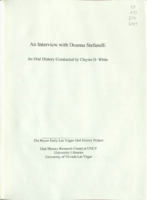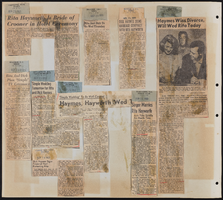Search the Special Collections and Archives Portal
Search Results

Transcript of interview with Roberta Kane by Barbara Tabach, September 6, 2017 and May 22, 2018
Date
Archival Collection
Description
Roberta “Bobbie” Kane (1932 - ) is the first known Jewish child born in Las Vegas. Her parents, Sallie and Mike Gordon, were liquor stores owners and among the founders of the first Jewish congregation in Las Vegas. Bobbie’s childhood remembrances are as a young girl who was fully aware that “Friday nights were reserved for religious services. Saturdays were always reserved for gin rummy.” In the late 1940s, as a teenager at Las Vegas High School (and 1950 graduate), Bobbie recalls Las Vegas as a small town and a joyful place to grow up. She briefly attended University of Southern California before marrying and beginning her family. In time, life brought her back to live with her parents. She pursued a career working for the Desert Inn group of hotels and helped open the Stardust in 1957. She was mentored by Mark Swain, “a six foot-four hunk of a cowboy” who worked for Moe Dalitz. This experience included driving Mark’s pink Cadillac to pick up hotel guests. This provided her with a
Text

Transcript of interview with Deanna Stefanelli by Claytee White, May 3, 2010
Date
Archival Collection
Description
Deanna Stefanelli and her family moved to Las Vegas when her husband John Stefanelli accepted a position as a professor in Food and Beverage at UNLV. She took a part-time job in the admin office of the university's library in 1981. It was also an ideal time for her to return to college to finish her degree. Eventually she became full-time and enjoyed the growth and change of UNLV and the library. Deanna recalls the physical and personnel changes of the library. She describes some of the fun activities that kept them a close work community—from the Friends of the Library to book sales and pancake breakfasts, to a newsletter and learning to make sushi with Myoung-ja Kwon.
Text

Sandra Gray oral history interview: transcript
Date
Archival Collection
Description
Oral history interview with Sandra Gray conducted by Elsa Lopez and Barbara Tabach on December 13, 2019 for the Latinx Voices of Southern Nevada Oral History Project. In this interview, Dr. Gray discusses her family history, and describes how her parents are immigrants from Durango, Mexico and moved from East Los Angeles, California to East Las Vegas, Nevada in 1991. After getting her bachelor's degree in psychology from the University of Nevada, Las Vegas (UNLV) she started a behavioral health agency that provided rehabilitative mental health services to children primarily in the foster care system. She went on to earn a master's degree in mental health counseling, a master's in psychology, and a doctoral degree in clinical psychology. She is the founder of Empower LV, which strives for equitable access to sports and tutoring. Dr. Sandra Gray is also the owner and operator of Innovation Behavioral Health Solutions, LLC.
Text

Interview with Robert Elmer Friedrichs, February 25, 2005
Date
Archival Collection
Description
Text

Transcript of interview with Kim Bird & Pam Fogliasso by Claytee D. White, February 8, 2013
Date
Archival Collection
Description
Kim Bird's family moved to Las Vegas in 1955 when she was twelve years old. Pam Fogliasso arrived in 1954 with her family in 1954, when she was ten. Kim married and had a son and a daughter; she lives in Las Vegas. Pam married, had two children, and lives in Parumph, Nevada. Though Kim and Pam moved here in the mid-1950s, they had family members who had lived in Southern Nevada and worked on building Hoover Dam - Kim's grandfather and Pam's great-uncle. Both women remember growing up in a Las Vegas that was run by the mob and safe for teenagers; meeting friends in local hangouts such as the Blue Onion and attending sock hops, babysitting, and cruising down Fremont Street. They attended high school with black students but were also aware of the segregation that existed on the Strip. This interview focuses on Kim and Pam's experiences growing up in Las Vegas, and on their teenaged years attending Rancho High School.
Text

Transcript of interview with Liliam Lujan Hickey by Layne Karafantis, March 18, 2010, & March 25, 2010
Date
Archival Collection
Description
Liliam Lujan Hickey is best known in the state of Nevada for being the first Hispanic woman elected to the State Board of Education as well as for the enormous contributions she made while serving from 1998 to 2000. For this, an elementary school in Clark County bears her name. Despite many obstacles, Liliam has continually dedicated herself to standing up for the causes she believes in, such as providing preschool education to the underprivileged, preparing youth to enter the workforce, helping other Hispanics run for office, and proving that with enough courage anyone can accomplish their dreams. Born in Havana, Cuba in 1932, Liliam led a sheltered life that revolved mostly around her studies at a French Dominican school. She met her first husband, Enrique Lujan, when she was only sixteen and they wed soon after. Enrique was twelve years her senior, owned many casinos on the island, and provided a luxurious existence for Liliam and their three children. However, this lifestyle abruptly changed when Castro assumed power in 1959 and Liliam and her family were compelled to relocate to the United States. In Miami, Enrique assisted other refugees financially, hoping that his wealth would remain secure in Cuba. He was wrong. This left the family destitute. In addition to casinos, Enrique had been Cuba?s coach for the Olympics. He moved the family to York, Pennsylvania, where he hoped to find work at the York Barbell Company. Liliam, who had been accustomed to having maids and nannies in Cuba, found herself doing all the housework while she also worked in a factory. The change could not have been more dramatic and the living conditions became unbearable. The family chose to move to San Diego in a Volkswagen Minivan with the hope for a better life. The next few years brought many transitions. Things did turn around in San Diego, and Liliam she recalls her years in southern California as some of the happiest of her life. Liliam found a job working at the Scripps Clinic in La Jolla. After a few years, Enrique found a job in Las Vegas and the family moved again. In Las Vegas, Liliam gave birth to her fourth child, Mary, and life once again became financially difficult for the family. In 1972, the situation grew worse with Enrique?s untimely death. Liliam was a widow at forty years of age. She had to teach herself how to drive a car, write checks, and perform financial tasks that Enrique had insisted on managing while he was alive. Determined not to give up, however, she worked tirelessly to keep the family together. Amidst all this, a friend introduced Liliam to Tom Hickey, and after a brief courtship they were married in 1981. Within a few years, Liliam became active in politics, running for the State Board of Education. Her campaign manager advised her that voters would not be receptive to photos of a Hispanic woman on billboards, and to capitalize on the name “Hickey,” which was a recognizable name because her husband was an assemblyman. She took the manager?s advice and was elected in that campaign and for two more terms, the maximum limit for the office. After the first race, she proudly displayed her face on billboards across the state. During her time at the State Board of Education, Liliam dedicated herself to helping all children receive a better education in Nevada, not only Hispanics. She co-founded the Classroom on Wheels [COW] program, which brought buses to poor neighborhoods to provide pre-school education. She established Career Day, which pairs high schools students with business professionals in an effort to help them make the transition into the workforce. While the COW program is no longer running, 8 Career Day still operates and awards scholarships in Liliam?s name annually, which helps youth receive the educational opportunities they need to succeed. And she involved Hispanic youth in Boy Scouts by bringing ScoutReach to the Las Vegas valley. Lujan Hickey worked in a wide array of other community organizations. In the 1970s, she began to work with Circulo Cubano, which later became the Latin Chamber of Commerce, and she would later belong to the National Chamber of Commerce. A longstanding member of the League of Women Voters, Liliam saw the need to get Hispanics more involved in politics in the state. Her story is one of great inspiration, and when asked why she does it, she simply replies with a smile, “I love life.” Hickey?s narrative offers the reader a glimpse of the experiences of the Cuban refugee experience in the U.S. in general. Specific to Las Vegas, it provides a rare story of the experiences of early Latinas in the political and economic development of Las Vegas in the last half of the twentieth century.
Text

Transcript of interview with Louis Evans by Jeannettte Lonpergan, February 17, 1976
Date
Archival Collection
Description
On February 17, 1976, Jeannette Lonpergan interviewed well driller and dairy worker, Mr. Louis Evans (born on August 8th, 1914 in Jones County, Iowa) in his home in Las Vegas, Nevada. Mrs. Lonpergan’s husband, Mr. Dennis Lonpergan, was present during the interview and joined in on the discussion. Mr. Louis Evans’ wife, Mrs. Evans, was also present during the interview. Mr. Evans relocated to Nevada from Iowa in search of employment. Construction on the Hoover Dam had begun at this point; Mr. and Mrs. Evans recall their earliest recollections of Nellis Air Force Base and McCarran Airport. The interview covers the history of Nevada from Mr. Evans’ perspective. Mr. Evans discusses the paving of roads, employment, religious activities, housing developments, early above ground atomic tests, social and environmental changes and mining in Nevada.
Text

Transcript of interview with Harold R. Hunter by Philip John Mile, March 19, 1978
Date
Archival Collection
Description
On March 19, 1978, Philip John Mile interviewed former chef, Harold R. Hunter (born 1901 in Norwich, Kansas) about his life in Southern Nevada. Hunter discusses his different experiences working in early Las Vegas restaurants during the thirties and forties. Hunter also discusses the rapid growth of the Mormon community during this time.
Text

